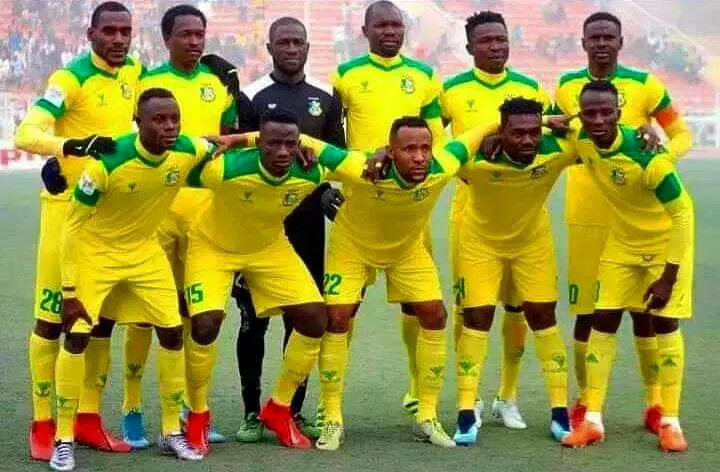Scenes of chaos marked the Nigeria Premier Football League encounter between Shooting Stars (3SC) and Kano Pillars at the Sani Abacha Stadium on Sunday, as upset fans stormed the pitch following a dramatic stoppage-time equalizer by the visitors. Match officials, players, and even spectators were caught in the storm of violence that followed, triggering national condemnation and renewed questions about the commercial viability of a league still struggling to make itself attractive to investors.
The match had seemed almost won by Kano Pillars when Mustapha Jibrin scored in the ninth minute. But Adams Mustapha of Shooting Stars popped up in injury time to level the score 1-1. What followed within seconds undermined the entire spectacle. Some supporters of Pillars invaded the pitch. Referees and match commissioners were pursued, pelted with objects, and physically assaulted. Reports say that some players from 3SC also bore injuries to the head, among them Ismail Ayodele and Adams Agba’a. Security forces responding to the mayhem used teargas to disperse the crowd.
Kano Pillars General Manager, Ahmed Musa, formerly of Nigeria’s national team, issued an unreserved apology to Shooting Stars, the league officials, referees, and Nigerians at large on all of his social media platforms. Describing the events as “heartbreaking, shameful, and completely unacceptable,” he said the club would cooperate fully with authorities to identify and punish those involved. He called on supporters to show passion responsibly, reminding them that loyalty must never shade into violence.
The Nigeria Premier Football League issued a preliminary statement condemning the violence and vowing to launch investigations. The league is treating the incident with utmost seriousness, awaiting the match commissioner and referee reports before issuing any sanctions. Officials emphasized that safety and professionalism must be preserved in all NPFL venues across the country.
Ordinary citizens, sports fans, analysts, former players, and media commentators described the violence as disgraceful. Some asked whether football in Nigeria has lost its moral bearings if supporters can assault referees and officials simply because they perceive a decision as unjust. Others emphasized that incidents like this hurt the reputation of the NPFL and damage the trust of fans who want to see fair play, not chaos.
Many also pointed to repeated patterns of violence, overreactions to referee decisions, pitch invasions, and failure of security arrangements. Sports business analysts said these recurring breakdowns feed into a larger concern: companies and corporations will hesitate to invest in leagues where match environments are unpredictable, where drama includes violence, and where brand association may risk reputational damage.
The NPFL has long struggled to make the league profitable. Its issues include poor match officiating, weak infrastructure, inconsistent broadcast deals, unreliable security, and low attendance in many venues. Violence and hooliganism remain powerful deterrents to long-term investment, especially when broadcast partners and sponsors fear association with negative headlines.
The loss of reliability also hurts commercial deals. Broadcast partners expect orderly, reliable fixtures. Sponsors want visible exposure, safe venues, and good organization. But when supporters attack officials, pitch security breaks down, and matches end in controversy rather than celebration, those corporate entities may pull back or demand stronger guarantees. Guaranteeing stability in those areas is essential if the NPFL wants to attract serious long-term investment.
Fans themselves feel betrayed. Some supporters of Kano Pillars say they were disappointed by the late equalizer but disavow violence. Many Shooting Stars fans felt unsafe. Players expressed fear and frustration. Officials worry about doing their jobs under threat, and media covering the match say they were nearly encircled. All this contributes to anxiety in the game ecosystem about what it means to officiate, play, or even watch NPFL games in flawed environments.
In earlier seasons, broadcasters pulled back or reduced coverage. Some TV partners cited risk. Some recent deals have fallen apart. StarTimes, for example, terminated its broadcast deal reportedly early, affecting visibility and revenue. These patterns make stakeholders question whether the NPFL can become commercially sustainable if incidents like the Kano crisis continue.
The Kano Pillars vs Shooting Stars game may have ended in a draw, but the cost to the league’s reputation may be much greater. For NPFL to grow beyond passion and into professionalism, every actor must play a part: clubs, fans, league officials, and security agencies. Corporations looking to invest need stability and certainty that the match experience will not end in scandal.
Unless NPFL treats this as a wake-up call, these violent flare-ups will continue to undermine its efforts at reform. Investments will stay on the sidelines until investors are confident they are getting a clean, safe, and reliable product. For now, Nigerians condemned the violence loudly. They are watching to see what NPFL will do beyond statements. Actions taken now will tell whether this league is a place worth betting on.
Samuel Aina

